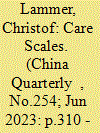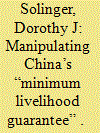|
|
|
Sort Order |
|
|
|
Items / Page
|
|
|
|
|
|
|
| Srl | Item |
| 1 |
ID:
192177


|
|
|
|
|
| Summary/Abstract |
Examining the “world's largest cash-based social policy” through the lens of care reveals widely shared scalar imaginaries and the productivity of care in constituting scale. In standardizing the minimum livelihood guarantee (dibao), officials, applicants and researchers in rural Sichuan cited both “too much” and “not enough” care at the scale of the family in recommending or rejecting state assistance. Different levels of organization (scale1) were not stable bases with specific sizes and qualities (scale2) that enabled or limited care. Dibao-related practices were evaluated as an appropriate (“filial piety”), insufficient (“individualism”) or excessive (“corruption”) amount of family care. Care became an indicator of kinship measurements and a marker of state boundaries. Thus, scale (in both meanings) was enacted in China, as elsewhere, through negotiations of needs and responsibilities, through evaluations of care practices and their outcomes. In this sense, care scales.
|
|
|
|
|
|
|
|
|
|
|
|
|
|
|
|
| 2 |
ID:
184722


|
|
|
|
|
| Summary/Abstract |
How do subnational agents exercise policy discretion in the social welfare sphere? To what extent do they do so as a result of various bureaucratic and fiscal incentives? The literature has documented several explanatory frameworks in the context of China that predominantly focus on the realm of developmental policies. Owing to the salient characteristics of the social policy arena, local adaptation of centrally designed policies may operate on distinctive logics. This study synthesizes the recent scholarship on subnational social policymaking and explains the significant interregional disparities in China's de facto urban poverty line – the eligibility standard of the urban minimum livelihood guarantee scheme, or dibao. Five research hypotheses are formulated for empirical examination: fiscal power effect, population effect, fiscal dependency effect, province effect and neighbour effect. Quantitative analysis of provincial-level panel data largely endorses the hypotheses. The remarkable subnational variations in dibao standards are explained by a salient constellation of fiscal and political factors that are embedded within the country's complex intergovernmental relations and fiscal arrangements. Both a race-to-the-top and a race-to-the-bottom may be fostered by distinctive mechanisms. The unique role of provincial governments as intermediary agents within China's political apparatus is illuminated in the social policy arena.
|
|
|
|
|
|
|
|
|
|
|
|
|
|
|
|
| 3 |
ID:
154156


|
|
|
|
|
| Summary/Abstract |
In 1999, the State Council set forth an urban social assistance program aimed chiefly at pacifying protesting laid-off workers and compensating for the breakdown of the work-unit-based welfare benefits that had obtained under the planned economy. While an initial goal was to ensure the political stability that would allow enterprise reform to proceed unchallenged, over time the content of the scheme shifted in line with new regime goals. First the program spread to the countryside, as the New Socialist Countryside model was installed. In the past few years, in line with a tightening of financial commitment, leaders have demanded that the able-bodied poor should work, not be succoured, and that the program’s allowances target the desperate. Also, beginning in 2014 and continuing into 2016 there has been heavy emphasis on fighting graft and corruption in the program. The paper details five alterations that have emerged – or policy slants for which earlier, less extreme changes in implementation have intensified – since Xi Jinping ascended to power. The big message here is that the regime has repeatedly reshaped this initiative to match the changing political agenda of the Party.
|
|
|
|
|
|
|
|
|
|
|
|
|
|
|
|
| 4 |
ID:
175560


|
|
|
|
|
| Summary/Abstract |
While it is increasingly recognized that shame is a pernicious component of the experience of poverty, the stigma generally associated with social assistance provision is less marked with respect to China's Minimum Living Security System, also known as dibao. This enigma is explored and illuminated drawing on two streams of indigenous Chinese scholarship and qualitative fieldwork in eight villages in Shanxi province. Economic and political changes prioritizing economic growth and individual wealth have increased the shame associated with poverty, manifest as loss of face, low mian (status) and lack of lian (integrity). However, this shame does not transfer to dibao because the scheme has been transformed locally into a universal age supplement that partially fulfils the demands of filial piety and which is seen to reflect and contribute to guanxi (social influence).
|
|
|
|
|
|
|
|
|
|
|
|
|
|
|
|
|
|
|
|
|